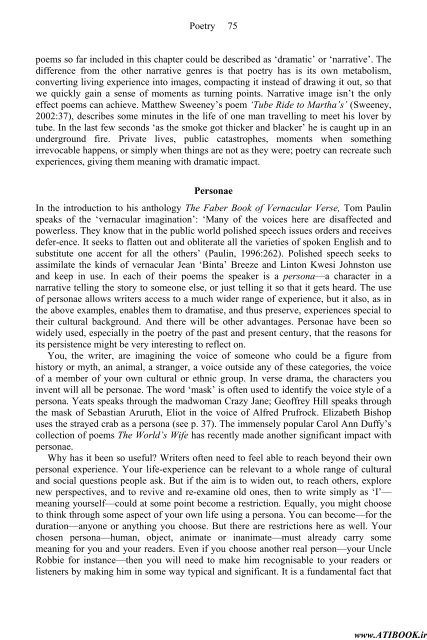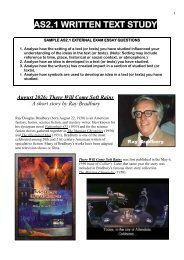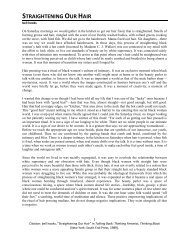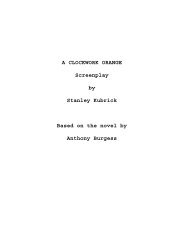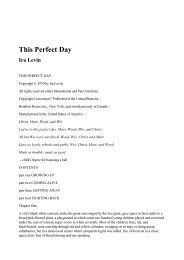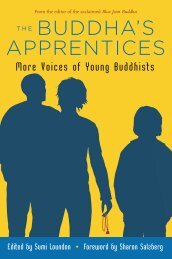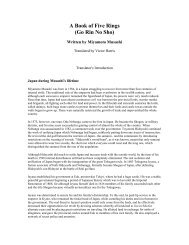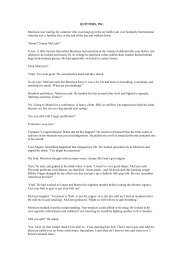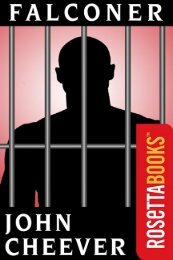9780415317856_the_routledge_creative_writing_coursebook
9780415317856_the_routledge_creative_writing_coursebook
9780415317856_the_routledge_creative_writing_coursebook
Create successful ePaper yourself
Turn your PDF publications into a flip-book with our unique Google optimized e-Paper software.
www.ATIBOOK.irPoetry 75poems so far included in this chapter could be described as ‘dramatic’ or ‘narrative’. Thedifference from <strong>the</strong> o<strong>the</strong>r narrative genres is that poetry has is its own metabolism,converting living experience into images, compacting it instead of drawing it out, so thatwe quickly gain a sense of moments as turning points. Narrative image isn’t <strong>the</strong> onlyeffect poems can achieve. Mat<strong>the</strong>w Sweeney’s poem ‘Tube Ride to Martha’s’ (Sweeney,2002:37), describes some minutes in <strong>the</strong> life of one man travelling to meet his lover bytube. In <strong>the</strong> last few seconds ‘as <strong>the</strong> smoke got thicker and blacker’ he is caught up in anunderground fire. Private lives, public catastrophes, moments when somethingirrevocable happens, or simply when things are not as <strong>the</strong>y were; poetry can recreate suchexperiences, giving <strong>the</strong>m meaning with dramatic impact.PersonaeIn <strong>the</strong> introduction to his anthology The Faber Book of Vernacular Verse, Tom Paulinspeaks of <strong>the</strong> ‘vernacular imagination’: ‘Many of <strong>the</strong> voices here are disaffected andpowerless. They know that in <strong>the</strong> public world polished speech issues orders and receivesdefer-ence. It seeks to flatten out and obliterate all <strong>the</strong> varieties of spoken English and tosubstitute one accent for all <strong>the</strong> o<strong>the</strong>rs’ (Paulin, 1996:262). Polished speech seeks toassimilate <strong>the</strong> kinds of vernacular Jean ‘Binta’ Breeze and Linton Kwesi Johnston useand keep in use. In each of <strong>the</strong>ir poems <strong>the</strong> speaker is a persona—a character in anarrative telling <strong>the</strong> story to someone else, or just telling it so that it gets heard. The useof personae allows writers access to a much wider range of experience, but it also, as in<strong>the</strong> above examples, enables <strong>the</strong>m to dramatise, and thus preserve, experiences special to<strong>the</strong>ir cultural background. And <strong>the</strong>re will be o<strong>the</strong>r advantages. Personae have been sowidely used, especially in <strong>the</strong> poetry of <strong>the</strong> past and present century, that <strong>the</strong> reasons forits persistence might be very interesting to reflect on.You, <strong>the</strong> writer, are imagining <strong>the</strong> voice of someone who could be a figure fromhistory or myth, an animal, a stranger, a voice outside any of <strong>the</strong>se categories, <strong>the</strong> voiceof a member of your own cultural or ethnic group. In verse drama, <strong>the</strong> characters youinvent will all be personae. The word ‘mask’ is often used to identify <strong>the</strong> voice style of apersona. Yeats speaks through <strong>the</strong> madwoman Crazy Jane; Geoffrey Hill speaks through<strong>the</strong> mask of Sebastian Aruruth, Eliot in <strong>the</strong> voice of Alfred Prufrock. Elizabeth Bishopuses <strong>the</strong> strayed crab as a persona (see p. 37). The immensely popular Carol Ann Duffy’scollection of poems The World’s Wife has recently made ano<strong>the</strong>r significant impact withpersonae.Why has it been so useful? Writers often need to feel able to reach beyond <strong>the</strong>ir ownpersonal experience. Your life-experience can be relevant to a whole range of culturaland social questions people ask. But if <strong>the</strong> aim is to widen out, to reach o<strong>the</strong>rs, explorenew perspectives, and to revive and re-examine old ones, <strong>the</strong>n to write simply as ‘I’—meaning yourself—could at some point become a restriction. Equally, you might chooseto think through some aspect of your own life using a persona. You can become—for <strong>the</strong>duration—anyone or anything you choose. But <strong>the</strong>re are restrictions here as well. Yourchosen persona—human, object, animate or inanimate—must already carry somemeaning for you and your readers. Even if you choose ano<strong>the</strong>r real person—your UncleRobbie for instance—<strong>the</strong>n you will need to make him recognisable to your readers orlisteners by making him in some way typical and significant. It is a fundamental fact that


